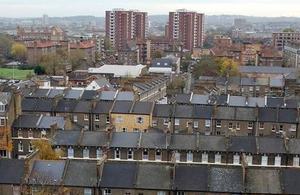The change made in August is reported to have triggered a big increase in homelessness among refugees
The Big Issue and the Guardian reported last week that the Home Office has reversed a recent change made to the amount of time given to newly-recognised refugees before they are required to leave their asylum accommodation.
 Image credit: UK GovernmentThe time period is known as the 'move-on' period and it had previously been 28 days starting from when a person receives their Biometric Residence Permit (BRP). As we reported on EIN in September, changes were enacted by the Government in August that shortened the move-on period by calculating the 28 days as starting when a person receives a grant letter telling them their protection claim has been accepted.
Image credit: UK GovernmentThe time period is known as the 'move-on' period and it had previously been 28 days starting from when a person receives their Biometric Residence Permit (BRP). As we reported on EIN in September, changes were enacted by the Government in August that shortened the move-on period by calculating the 28 days as starting when a person receives a grant letter telling them their protection claim has been accepted.
Lord Sharpe of Epsom, the Parliamentary Under Secretary of State for the Home Office, confirmed last week that the Government has now reverted to starting the move-on period from when a person's BRP has been issued.
A spokesperson for the Government also confirmed in a statement to the Guardian: "Once a newly recognised refugee is issued a biometric residence permit, they get 28 days to move on from asylum accommodation."
A debate was held in the House of Lords last Monday on the notice period given to refugees for leaving their Home Office accommodation. The Lord Bishop of London noted that "[m]any of those who support refugees are receiving increasing numbers of concerns that refugees are being given as few as seven days' notice before being evicted, causing widespread homelessness and greater concern."
Lord Sharpe of Epsom, the Parliamentary Under Secretary of State for the Home Office, said in response: "My Lords, I will go through the process: all individuals who receive a positive decision on their asylum claim can remain on support and in their accommodation for at least 28 days from when their decision is served. However, as I said in my earlier Answer, current practice is that individuals remain on that support and in accommodation for 28 days from the point of the biometric residence permit being issued. That can be five to seven days after the asylum decision. This means that individuals have longer than the 28 days' notice after receiving their grant of leave to make onward arrangements. Confirmation of the exact date that an individual's support and accommodation are due to end will be issued in a notice-to-quit or notice-to-vacate letter from the individual's accommodation provider. This notice will be issued at least seven days before support and accommodation is due to end. There are at least three opportunities there where the asylum seeker, or the asylum claimant who has received a decision, will be notified. They have plenty of time."
The Big Issue has published a number of recent articles highlighting how the August change had triggered an increase in homelessness among refugees. In an article last month, the Big Issue noted that around 1,500 refugees were assessed as homeless between August and October 2023, up from 450 in the same period last year.
The Big Issue reported last week that the Home Office now says the change was only a temporary measure for August, though Steve Smith of Care4Calais said the Government had performed a U-turn.
Smith told the Big Issue: "This U-turn is as much of an admission of wrongdoing as you will get from the Home Office under this government. Recent months have seen a huge spike in refugees being made homeless, with our volunteers aware of friends sleeping rough on our streets across the country."
The Guardian reported that ministers had "quietly reversed" the administrative change made in August. According to the Guardian, the change was reportedly made at the request of the then immigration minister Robert Jenrick. The Home Office said it was only ever meant to be temporary.
Rick Henderson of the charity Homeless Link told the Guardian that the change had caused "months of chaos and hardship" for refugees and had put a huge strain on charities. Henderson was quoted as saying: "The Home Office's decision to change when the notice period for people granted refugee status to leave asylum accommodation is issued was deeply damaging, causing rough sleeping to skyrocket and exposing new refugees to the trauma of homelessness."
In October, the Refugee Council and a number of other NGOs published a 7-page briefing explaining the change and why it would leave many more refugees facing homelessness and destitution. You can download it here.
The briefing also repeated the call by the Refugee Council and other organisations for an extension of the move-on period to at least 56 days. A recent editorial in the Guardian backed the call, stating: "Ministers should listen to the Refugee Council and others calling for a rethink. … While 28 days is a bare minimum, the 56-day notice period proposed by charities is more realistic and would reduce the pressure on the voluntary sector, councils and wider public realm."